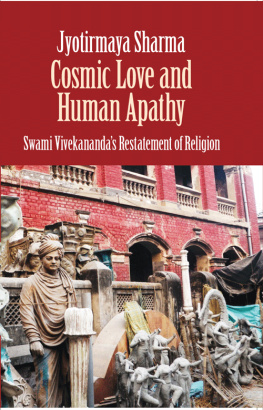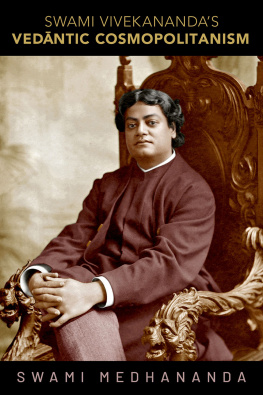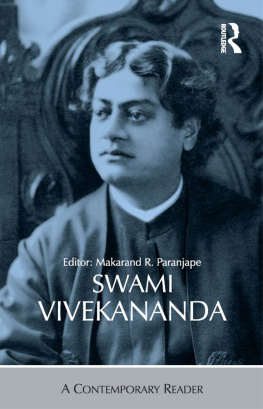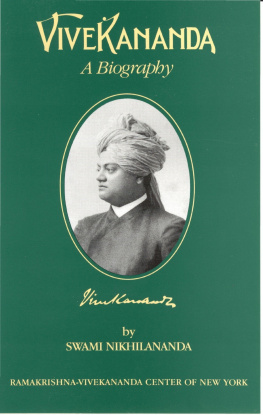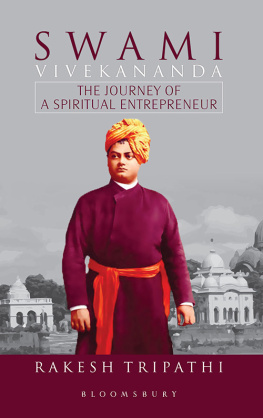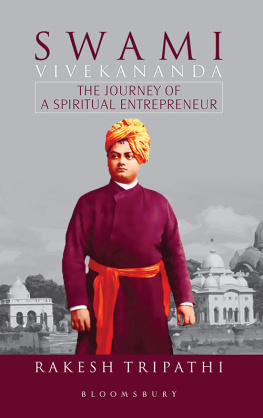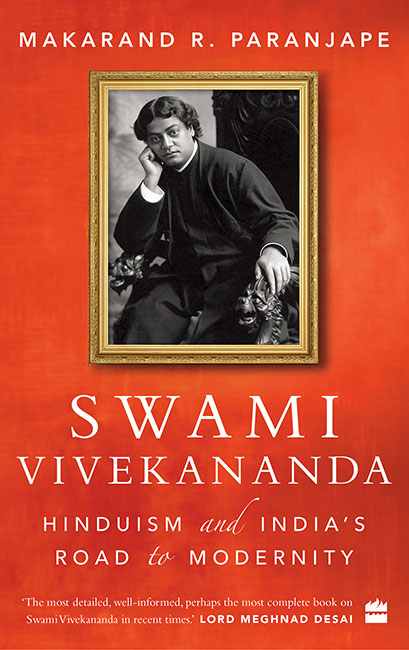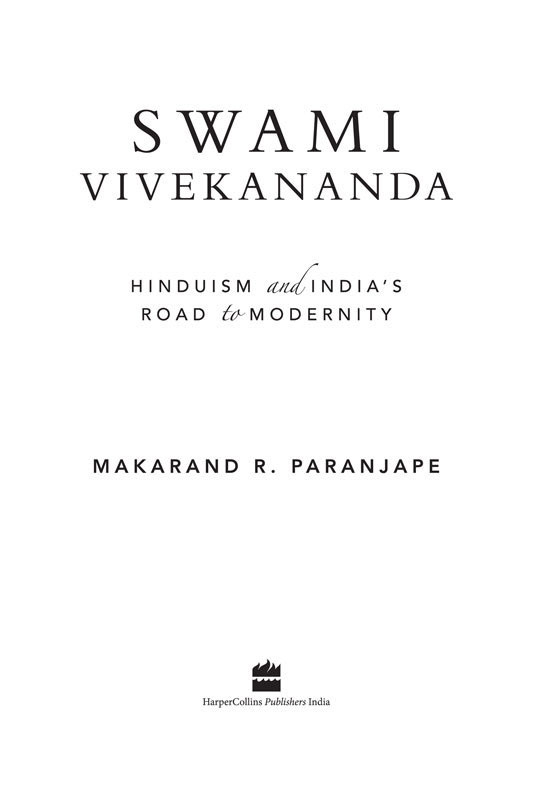For
Papi Ma,
Dr Usha and Mr Raja Subramanian,
Pritha, Gaurav
and Leela Iyer
four generations,
now family.
CONTENTS
The Unknown Vivekananda

I HAVE FELT THE PRESENCE of grace in the writing and completion of this book. Several of these chapters were drafted during Swami Vivekanandas sesquicentennial anniversary celebrations. I participated in the commencement of the official commemoration in March 2013 at the Rashtrapati Bhavan, New Delhi, where the then President of India, Pranab Mukherjee, himself did the honours, presenting a paper in the conference that followed. As it happened, I also participated in possibly the last of the official programmes a year later, in February 2014. It was held in the city of the Swamis birth, Kolkata, at an institution established to carry forward his work and message, the Ramakrishna Mission Institute of Culture, Gol Park. Through these 150th anniversary celebrations, I met and listened to many distinguished scholars and devotees of Swamiji. Together, we engaged in an endeavour to better understand the life, work and legacy of Vivekananda. No wonder, today, as I see the finished manuscript before me, I am filled with a sense of wonder and gratitude. Without all these fortunate and fortuitous convergences, how could I possibly have finished this project?
Yet, looking back over these five years, I am convinced of something quite contrary to what might be expected consequent on being so engrossed in the life and works of this extraordinary individual. After attending so many events, symposia, conferences, and listening to scores of eminent speakers, besides reading nearly every book or essay on Vivekananda, I came to a rather unexpected conclusion. We have to contend with the very real probability that we may have still not understood the Swami adequately. That is because, with our limiting habits of thought and mind, we tend to convert if not reduce Vivekananda to a dimension that is much more comprehensible, palatable or manageable to us. Vivekananda, in other words, still remains somewhat of an enigma, even as we keep rehearsing and regurgitating what we know about him already. In fact, one of the alternate titles of this book could be The Unknown Vivekananda.
In my view Vivekananda remains unknown if familiar for three reasons. First of all, the actual store of information and knowledge about him has not significantly increased in the last few decades. The new, corrective edition of his multi-volume Complete Works, in the making for many years, is still not out. At the same time, his papers, in custody of the Ramakrishna Mission, are not yet accessible to the public. When it comes to the secondary material on Vivekananda, once again, we notice that very few new readings or interpretations have emerged. What has, barring a few exceptions such as Hindol Senguptas refreshingly readable The Modern Monk (Penguin, 2016), changed considerably is the massive increase in the publicization and politicization of Swamijis life and legacy, to be expected with the rise of the Bharatiya Janata Party as Indias ruling party. For Hindutva cadres, Vivekananda is an object of reverence, if not an iconic poster persona. In addition to his traditional constituency of devotees belonging to the RamakrishnaVivekananda movement, many others in India now swear by him. But such zeal and adulation does not take kindly to a critical engagement with his life and work. On the other hand, purely secular, intellectual academics, too, remain quite impervious to certain aspects of Vivekanandas mind and method. Given our already entrenched ideological prejudices and belief systems, not to mention our intellectual interests and investments, it is hard for most of us to take a fresh look at the life, world and work of this extraordinary monk.
Here, I would venture to add that like his own mentor, Sri Ramakrishna, and some of the other extraordinary figures of his times, Vivekananda was definitely a mystic, even if he is regarded almost exclusively as an activist. He deliberately set out to attain higher states of consciousness. What is more, he committed himself to the lifelong arduous meditative and spiritual practices or sadhanas to attain them. He also tried to lead not only his disciples, but also vast sections of humanity (whom he addressed through his speeches and writings) to similar realizations. We must acknowledge that one of the key challenges before us is how to take cognizance of those extraordinary states and planes of consciousness, even as we uphold the norms of reason and intellect in our approach to his larger-than-life personage. Our imperative is, thus, to mediate between an unthinking adulation and devotionalism, on the one hand, and an unblinking and overly reductive rejection of the spiritual dimension on the other. In addition, we must take into account the inordinate politicization of his life. These challenges bring us to the heart of Swami Vivekanandas legacy and his relevance in the contemporary world.
That is why, in my view, the known Vivekananda should not interest us that much. Instead, it is the unknown Swamiji who still beckons to us from across the gulf of these 150 years. To exceed our limits of understanding, to reach the heights and depths of experiencing our true selves, to strive to attain samadhi or super-consciousness is what he tried to communicate to us throughout his short, dazzling life. Besides, of course, the complete social, cultural, economic and political transformation of India that he strove to initiate. Moreover, since these two aspects are deeply, even inextricably, interconnected Vivekananda remains lesser known than we think. This book, dwelling on the isthmus between the two, makes a case for why we must continue to strive to come closer to Vivekananda. In doing so, we will try to value and experience what he really was trying to convey. Perhaps if we try hard enough we may also have glimpses of that higher consciousness, whose elevating and uplifting touch he was trying to establish on the common ground of colonized and colonial India. To explore afresh the possibility of engaging with him seriously, then, is also be touched by the radical and transformative power of his life and teachings.
Many are the debts that I have incurred as I come to the conclusion of this endeavour to understand and interpret Vivekananda afresh. Here, I acknowledge them happily. First of all, the infinite association of spiritual gurus and teachers represented by Yogi Ramsuratkumar, the living master that I had the good fortune of meeting. Swami Rama of Haridwar, Ramana Maharshi of Tiruvannamalai and Sri Aurobindo of Pondicherry these I only met in the realms of the mind, but their presence and influence in my life are no less the real. The late Professor Girdhari Lal Tikku, member of my PhD dissertation committee, also belongs to this Guru Mandala. It was he who first put The Gospel of Sri Ramakrishna into my hands nearly forty years ago. I bow to these great masters, without whose blessings, my intellectual growth and spiritual development would have remained stunted.
Then the various learned and spiritually elevated swamis and monks of the Ramakrishna Math and Mission in whose contact, howsoever sporadic, my interest and faith in the RamakrishnaVivekananda tradition was strengthened. My intellectual connect and commitment to RamakrishnaVivekananda studies has received a lot of support from them. I gratefully acknowledge their role in bringing this book to fruition. I remember with special awe the day I spent at Belur Math on Swamijis birthday according to the Hindu tithi some three years back. The premises were thronging with monks and devotees, the former in such large numbers that it was like being back in the times of the Buddha. From the Vice-president of the order to humble, unknown sannyasis, they blessed me sumptuously as I fell at their feet in a spontaneous flow of respect and reverence. I had a great darshan of Sri Ramakrishna despite the thronging multitudes lining up to enter the main shrine. I knew then that I had to write this book.
Next page

